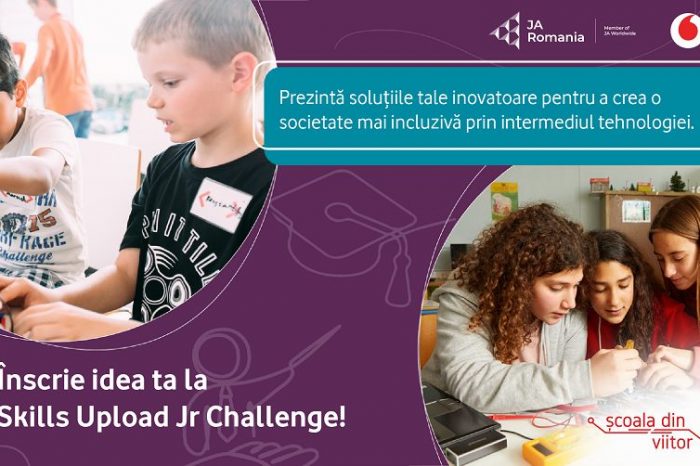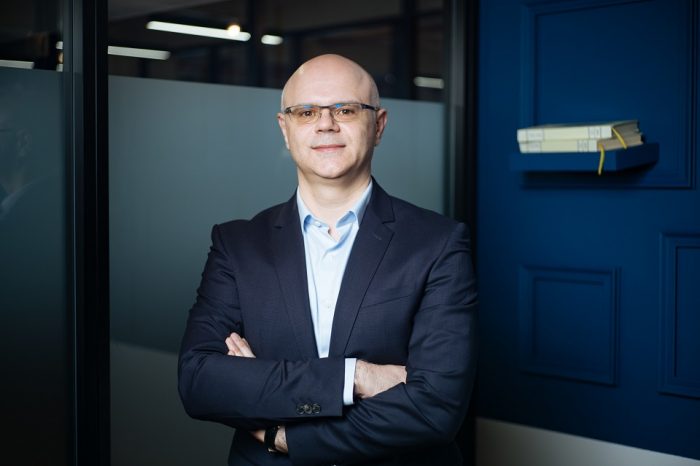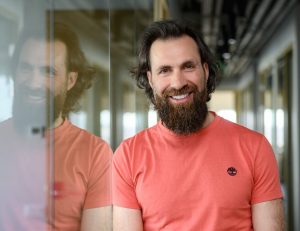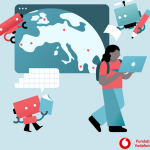Vodafone Foundation: 70% of Romanian students believe that AI will play a vital role in their professional career

- There is an “AI skills gap” in Europe;
- Less than 50% of schools have an AI policy;
- 72% of students surveyed say they learned about AI from their peers.
Around 70% of students in Romania believe that artificial intelligence (AI) will play a significant role in their professional lives, while just over half (54%) feel that they are prepared by their school to use this technology, according to a study by the Vodafone Foundation.
Only 40% of them believe that their teachers are competent in using AI, while over 70% of students claim to have learned about this technology from their peers. The Vodafone Foundation has identified a new ‘skills gap’ in artificial intelligence (AI) through its ‘Artificial Intelligence (AI) in European Schools’ study, conducted on a sample of 7,000 students from seven European countries, aged 12 to 17.
The results show that the integration of AI and digital tools in schools is now at a critical juncture and confirm that, while the immense potential of AI is widely recognised by the education sector, there are still no full or equitable resources in classrooms.
The main findings of the study show that:
- There are inequalities in access to connectivity and AI tools for students from low-income families;
- At European level, there is a lack of AI skills, content and guidance in the education sector;
- Students are concerned about the inequity and inequality that AI could generate, but are optimistic about the innovative approaches to learning brought by AI.
“Our research suggests that a new ‘AI skills gap’ is emerging, which could further widen digital skills inequalities, particularly for children from lower-income families. For Europe to fully reap the potential of AI, the education sector and policymakers need to ensure that this new technology is part of the curriculum for all children, regardless of their background,” said Joakim Reiter, Director of External Affairs at Vodafone Group and member of the board of the Vodafone Foundation.
“While Romanian students recognise that artificial intelligence plays a vital role in their academic success, a lack of digital skills and teacher training means that this technology is neglected in many schools. However, using AI without a critical understanding of how it works and without respecting ethical principles can amplify the risks. That is why the Vodafone Foundation in Romania program, School of the Future, part of the European initiative Skills Upload Jr., is launching new lesson plans on artificial intelligence, with a focus on the responsible and conscious use of this technology. These materials complement the resources offered at the beginning of the 2024/2025 school year in the Prepare for the Future course”, added Angela Galeța, Director of the Vodafone Romania Foundation.
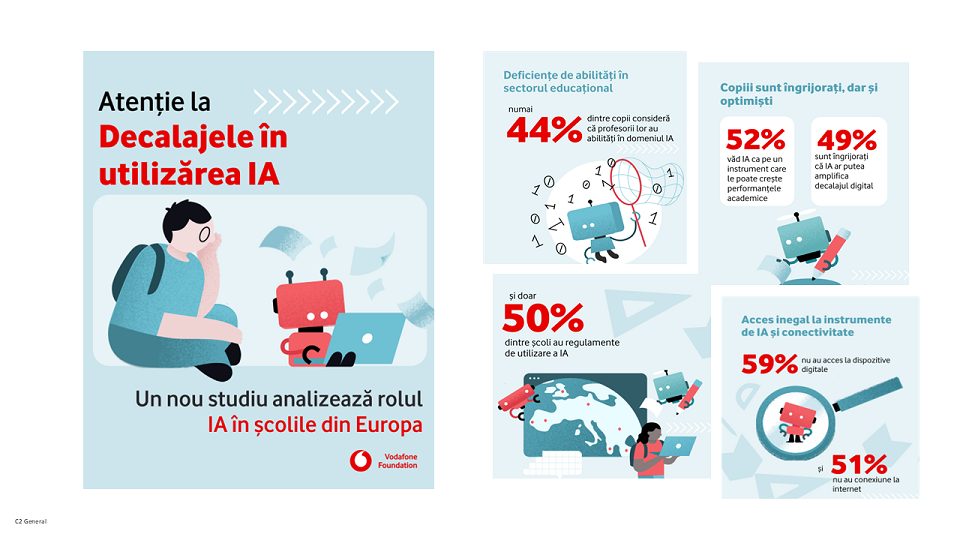
The study shows that 27% of European students surveyed felt overwhelmed when it came to using AI at school, and those from lower-income families are most exposed to the skills gap. In Romania, the level of familiarity with AI is higher the more educated and, at the same time, more affluent parents are – 65% of children with parents who say they “live comfortably” are fairly or very familiar with AI.
The study’s findings suggest that the lack of digital skills among teachers, as well as the lack of emphasis on this topic in schools and education policies, is resulting in a skills deficit in the field of artificial intelligence. 74% of all students surveyed believe that artificial intelligence will play a significant role in their professional lives, but less than half feel adequately prepared by their schools to use this new technology.
1. Inequalities in access to AI In Romania, parents with higher education (an indicator that is usually strongly associated with social status and high income level) are more likely to provide their children with permanent access to digital technology
47% compared to only 40% for parents with an average and low level (between which there are no differences). The level of familiarity of children with AI is higher the higher their parents’ level of education and, at the same time, higher income – 65% of children with parents who declare that they “live comfortably” are quite or even very familiar with AI. Muntenia and Bucharest (macroregion 3) have the highest score of access to digital technology (“always access” – 48%), while Moldova plus Southeast Romania (macroregion 2) have the lowest level on the same parameter (38%).
At the same time, children’s level of familiarity with AI tends to be directly proportional to age: 16 and 17-year-olds are the most familiar (45% are quite or even very familiar) while only 41% of those aged 14 to 15 and 38% of those aged 12 to 13 are quite or very familiar with AI.
2. Lack of AI skills
The vast majority of students surveyed in Romania (70%) believe that AI will play a significant role in their professional lives, but only slightly more than half (54%) feel adequately prepared by their schools to use this technology. Furthermore, only 40% of them considered their teachers to be competent in using AI, with most saying they learned about this technology from their colleagues (72%).
The fact that less than 50% of educational institutions had an AI policy and 16% of children said that their schools completely banned the use of AI may further aggravate the problem. 3. Concern and optimism among students Romanian students expressed a mix of optimism and concern about AI, in line with their peers in other European countries, with 56% of them believing that the new technology has the potential to make grading fairer (European average = 55%). At the same time, 49% feared that this could lead to discrimination, and over 45% of Romanian students are concerned that artificial intelligence could widen the gaps in academic success.
There is also optimism about how AI could influence innovation, including in education. Many students see AI as having the potential to improve their academic performance (66%). As part of its “Connecting for Good” strategy, the Vodafone Foundation is running the Skills Upload Jr program, in partnership with governments, schools and children in nine European countries, ensuring an integrated approach to digital education.
Based on this experience, the Vodafone Foundation believes that a more inclusive and equitable approach to integrating AI into education is now needed. It calls on policymakers, teachers and technology providers to encourage students to embrace AI as a tool for future learning and success, while developing ethical AI practices to address concerns about safety, bias and inequality.
The full research report can be found here. Commissioned as part of the Vodafone Foundation’s “Connecting for Good” strategy, the research was conducted by IPSOS between September and November 2024. A total of 7,000 children from Germany, the UK, Greece, Portugal, Romania, Spain and Turkey were interviewed. The Czech Republic also participated in a parallel study in January 2025.



